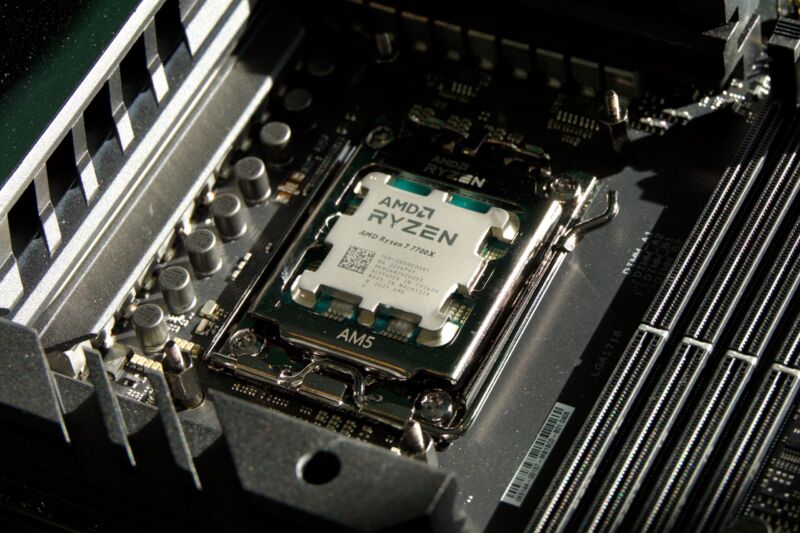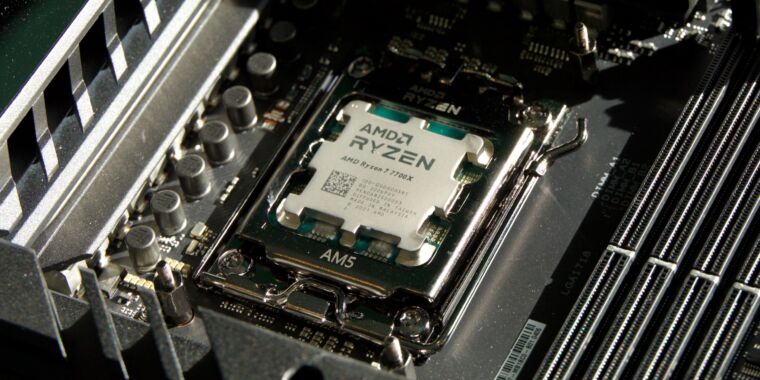
Andrew Cunningham
One of AMD's explanations for the somewhat disappointing performance reports from reviewers about the Ryzen 9000 earlier this month: that the upcoming Windows 11 24H2 update would bring a number of improvements to the CPU scheduler, which would improve the performance of the new CPUs and their Zen 5-based architecture.
But rather than make Ryzen owners wait for the 24H2 update to arrive later this fall (or have them install a beta version of a major OS update), AMD and Microsoft have rolled back the scheduler improvements to Windows 11 23H2. Users of Ryzen 5000, 7000, and 9000 CPUs can install the KB5041587 update by navigating to Windows Update in Settings, selecting Advanced options , then Optional updates.
“We expect the performance improvement between 24H2 and 23H2 with KB5041587 installed to be very similar,” an AMD representative told Ars.
In current versions of Windows 11 23H2, the CPU scheduler optimizations are only available via the built-in Windows Administrator account. The update also enables them for typical user accounts.
Older AMD CPUs also benefit
AMD's messaging has primarily focused on how the 24H2 update (and 23H2 with the KB5041587 update installed) improves Ryzen 9000 performance; in a handful of benchmarks it provided, the company says speeds can be improved by anything from zero to 13 percent over Windows 11 23H2. There are also benefits for users of CPUs running the older Zen 4 (Ryzen 7000/8000G) and Zen 3 (Ryzen 5000) architectures, though AMD hasn't been specific about how much either of those older architectures would improve.
YouTube channel Hardware Unboxed has been doing some early gaming testing with current builds of the 24H2 update, and there’s good news for Ryzen 7000 CPU owners and not so good news for AMD. The channel found that, on average, across dozens of games, average frame rates increased by about 10 percent for a Zen 4-based Ryzen 7 7700X. The Ryzen 7 9700X saw more improvement, as AMD said it would, but only by 11 percent. At stock settings, the 9700X is only 2 or 3 percent faster than the nearly 2-year-old 7700X in these games, whether you’re running the 24H2 update or not.
This early data suggests that both Ryzen 7000 and Ryzen 5000 owners will see at least a marginal benefit from upgrading to Windows 11 24H2, which is a nice free update with a software update. But there are caveats. Hardware Unboxed tested CPU performance strictly in games running at 1080p on a high-end Nvidia GeForce RTX 4090, one of the few scenarios in a modern gaming PC where your CPU will start to limit your performance before your GPU does. Once you play at higher resolutions, like 1440p or 4K, your GPU will typically become the bottleneck again, and the CPU performance gains won’t be as noticeable.
The update also takes the game’s already-high framerates to a higher level; one game, for example, went from an average framerate of 142 FPS to 158 FPS on the 7700X, and from 167 to 181 FPS on the 9700X. Even side-by-side, it’s an increase that’ll be difficult for most people to notice. Other kinds of workloads may see benefits too: AMD said its Procyon Office benchmark ran about 6 percent faster under Windows 11 24H2, but we don’t have definitive data on real-world workloads yet.
We don't expect performance to improve much, if at all, in heavily multi-threaded workloads where all CPU cores are actively being used at once, or in exclusively single-threaded workloads where a single core is being used all the time. AMD's numbers for both single- and multi-threaded versions of the Cinebench benchmark, which simulates these types of workloads, were exactly the same in both Windows 11 23H2 and 24H2 for Ryzen 9000.
Finally, it’s worth noting that the Ryzen 7 9700X was held back significantly by its new, lower 65W TDP in our testing, compared to the Ryzen 7 7700X’s 105W TDP. Both CPUs performed similarly in games that Hardware Unboxed tested, both before and after the 24H2 update. But the 9700X is still the cooler and more efficient chip, and it’s capable of higher speeds if you manually set its TDP to 105W or use features like Precision Boost Overdrive to adjust its power limits. How both CPUs perform out of the box is important, but comparing the 9700X to the 7700X at stock settings is a worst-case scenario for the Ryzen 9000’s generation-over-generation performance improvements.
Windows 11 24H2: Coming soon, but available now
Microsoft has released a few details about the core of the 24H2 update, which looks identical to previous Windows 11 releases but includes a new compiler, a new kernel, and a new scheduler under the hood. Microsoft specifically talked about this in the context of improving Arm CPU performance and the speed of localized x86 apps, as it prepares to push out Microsoft Surface devices and other Copilot+ PCs with new Qualcomm Snapdragon chips inside. Still, we’ll hopefully see some subtle benefits for other CPU architectures as well.
The 24H2 update is technically still in preview, available via Microsoft’s Windows Insider Release Preview channel. Users can download it from Windows Update, or as an ISO file if they want to create a USB installer to upgrade multiple systems. But Microsoft and PC OEMs have been pushing out the 24H2 update to Surfaces and other PCs for weeks now, and you shouldn’t have much trouble using it in day-to-day use at this point. For those who would rather wait, the update should roll out to the general public this fall.

